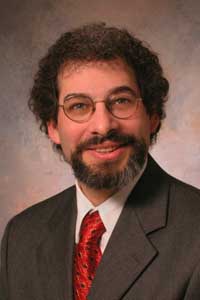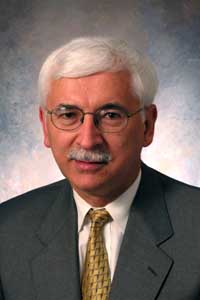Two physicians join faculty as department chairmen
By John EastonMedical Center Public Affairs
 Steve Goldstein  William Mieler | |
Two new members of the faculty in the Biological Sciences Division, Steve Goldstein and William Mieler, have been named Chairmen of Pediatrics and Ophthalmology and Visual Science, respectively.
Steve Goldstein, a leading authority on the molecular mechanisms underlying normal cardiac function and sudden life-threatening diseases of the heart, has been appointed Professor and Chairman of Pediatrics, effective Tuesday, June 15.
Goldstein, 47, is currently professor of pediatrics and cellular and molecular physiology, chief of the section of developmental biology and biophysics, and a member of the Boyer Center for Molecular Medicine at Yale University.
His appointment comes at a pivotal time in the history of Pediatrics at the University, as he will lead the department into its new home, the Comer Children’s Hospital, in December, and he will oversee a planned expansion of the pediatric clinical enterprise.
In addition, Goldstein, whose basic research program in non-channel signaling is internationally recognized, will create a new research institute dedicated to the field of molecular pediatrics and serve as the new institute’s first Director.
Goldstein received his joint B.A.-M.A. in biochemistry from Brandeis University in 1978, followed by an M.D.-Ph.D. from Harvard University in 1986. He did his pediatric internship, residency and a clinical fellowship in pediatric cardiology at Boston Children’s Hospital, Harvard Medical School, and completed a postdoctoral research fellowship at Brandeis.
He joined the departments of pediatrics and cellular and molecular physiology at Yale in 1993 as assistant professor, followed by promotions to associate professor (1996), section chief of developmental biology and biophysics (1997), associate professor with tenure (1999) and full professor (2001).
A member of the Biophysical Society, the Society of General Physiologists and the Society for Pediatric Research, and coordinating editor of the Quarterly Reviews of Biophysics, Goldstein has received numerous honors and awards, including the R.M. Bailer Science Award, a Clinical Investigator Development Award from the National Institutes of Health, a New Investigator Award from the Donaghue Foundation, the Distinguished Clinical Scientist Award from the Doris Duke Charitable Foundation and the E. Mead Johnson Award from the Society for Pediatric Research.
Goldstein’s research focuses on understanding the role of ion channels in normal physiology and in diseases of the heart, skeletal muscle, the kidney and the central nervous system. Because ion channels control the electrical activity of nerves and muscles, including cardiac muscle, their malfunction can cause dangerous heart rhythms and even sudden infant death syndrome.
In some children, inherited mutations in ion channels cause disease directly; in others, gene variations lead to an unstable situation in which drug therapy, for example, can trigger a disorder.
He also studies novel classes of ion channel proteins and accessory molecules that alter ion channel function in health and disease, as well as the life cycle of bacteria and fungi as a guide to finding new targets for anti-microbial agents.
William Mieler, an expert on the treatment of diseases of the macula, retina and vitreous, as well as medical and surgical management of eye injuries, has been appointed Professor and Chairman of Ophthalmology & Visual Science. Mieler, whose appointment began Thursday, April 15, came to Chicago from the Baylor College of Medicine, where he was professor of ophthalmology in the Cullen Eye Institute from 1999 to 2004.
Mieler, 50, earned his B.S. in 1975 and his M.D. in 1979 from the University of Wisconsin at Madison. He completed residency training in ophthalmology at the Bascom Palmer Eye Institute, University of Miami, in 1983, followed by fellowships in retina-vitreous at the Eye Institute, Medical College of Wisconsin, and in ocular oncology at the Wills Eye Hospital, Thomas Jefferson University. He joined the faculty at the Medical College of Wisconsin, Milwaukee, in 1986, and quickly rose through the ranks to become the Klieger professor of ophthalmology before he moved to Baylor’s Cullen Eye Institute in 1999.
Mieler is the author or co-author of more 250 peer-reviewed publications and 40 book chapters.
He is a member of the editorial board of Archives of Ophthalmology and RETINA. He also has served as section editor for “Retinal Surgery” in Ophthalmic Surgery: Principles & Practice (Blackwell), “Ocular Trauma” in Principles and Practice of Ophthalmology, and “Vitreous” in the American Medical Association’s Clinical Atlas.
He has edited two textbooks slated for release later this year: Ocular Trauma and Emergencies: Medical and Surgical Management, and Age-Related Macular Degeneration.
A director of the American Board of Ophthalmology since 1998, Mieler is the vice-chair of that board for 2004 and will serve as chairman in 2005. He served as president of the Macula Society from 2002 to 2004, and he is currently on the board of directors of the American Society of Retina Specialists and the Pan-American Association.
He has received many honors, including the Lifelong Education for the Ophthalmologist Continuing Education Recognition Award (2000), the Senior Honor Award (2001) from the American Academy of Ophthalmology, and the Honor Award (1997) and Senior Honor Award (2001) from the Vitreous Society.
Since 1995 he has been consistently recognized as one of the “Best Doctors in America,” and in 2002, the Consumers’ Research Council of America selected him as one of “America’s Top Ophthalmologists.”
![[Chronicle]](/images/sidebar_header_oct06.gif)